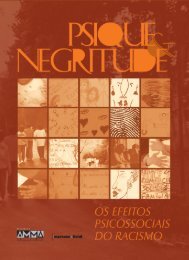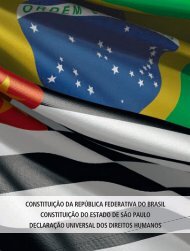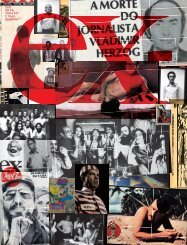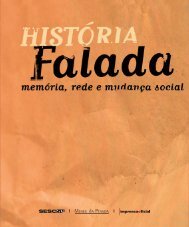CLÁSSICOS BRASILEIROS BRAZILIAN CLASSICS - Imprensa Oficial
CLÁSSICOS BRASILEIROS BRAZILIAN CLASSICS - Imprensa Oficial
CLÁSSICOS BRASILEIROS BRAZILIAN CLASSICS - Imprensa Oficial
You also want an ePaper? Increase the reach of your titles
YUMPU automatically turns print PDFs into web optimized ePapers that Google loves.
Brazilian Classics<br />
A selection of authors with works in public domain<br />
112<br />
VISCONDE DE TAUNAY<br />
(1843 – 1899)<br />
A Rio de Janeiro native, Alfredo d'Escragnolle<br />
Taunay was born into a family of artists,<br />
originally members of an important group of<br />
Frenchmen who came to Brazil in the second<br />
decade of the 19 th century in order to put their<br />
knowledge and artistic abilities in service of<br />
the Portuguese royal family. Taunay left behind<br />
his career as a military engineer to dedicate<br />
himself to politics, journalism and to literature.<br />
The Brazilian emperor, D. Pedro II, entitled<br />
him Viscount in 1889; during this same year he<br />
abandoned politics, as the imperial family was<br />
overthrown. His literary production is usually<br />
considered representative of the transition from<br />
Romanticism to Realism, somewhere in between<br />
a romantic idealism and a realistic vision of<br />
nature. His novel Inocência [Innocence] values<br />
the countryside`s way of life and the peculiarities<br />
of life away from the urban centers. It is his best<br />
known work, being constantly re-edited. It was<br />
translated to English in 1945.<br />
Review<br />
Main works<br />
Excerpt<br />
Innocence<br />
The legitimate backlander, explorer of deserts,<br />
doesn’t have, in general, a family. In his youth,<br />
his only goal is to pioneer lands, tread on fields<br />
where no man has treaded, wade through<br />
unknown rivers, unravel headwaters and rip<br />
through woods, untouched by any previous<br />
explorer. The more he travels, the more his pride<br />
grows; and his biggest satisfaction in life is to<br />
list the currents he transposed, the streams he<br />
baptized, the mountains he ranged over and the<br />
wetlands he quickly cut through or had to circle<br />
in a rare test of patience.<br />
The traveling writer<br />
“The totality of Taunay’s assemble of writings lies neither on the literary field, nor on the artistic one; rather, on the border<br />
of both. To put it differently, in his work there is a conjunction of national interests in which the registration of historical<br />
facts, in the case of the retreat from Laguna episode, represents the basis for a number of other descriptions. Elaborated<br />
a posteriori, they would yield different accounts, both historical and fictional. On a certain sense, the traveling writer<br />
fertilizes images that contribute to re-thinking Mato Grosso’s social formation, the origins and the contemporaneous<br />
presence of events, which made up the Latin-American scenario, from those most distant zones, consolidated in people’s<br />
general image of things as peripherical.”<br />
(Olga Maria Castrillon-Mendes, Taunay viajante e a construção da imagética de Mato Grosso)<br />
Romanticism and Realism<br />
“Innocence is a backlandish version of Romeo and Juliet. As the book flows, the typical 19th century rural mato-grossense<br />
speech develops with its dialogues. This speech, alongside the detailed descriptions and the pictoric trace, in spite of its<br />
Romantic insertion, lends the text a realism that prevents it from falling into an excessive sentimentalism. There is a world<br />
of barbarian habits, with dismal effects.”<br />
(Carlos Nejar, História da literatura brasileira)<br />
Cenas de viagem: exploração entre os rios Taquary e Aquidauana no distrito de Miranda (1868); A campanha da cordilheira<br />
(1869); Mocidade de Trajano (1871); La retraite de Laguna (1871); Inocência (1872); Lágrimas do coração (1873); A<br />
retirada de Laguna (1874); Ouro sobre azul (1875); Céus e terras do Brasil, evocações (1882); Amélia Smith (1886); No<br />
declínio (1889); O encilhamento (1894); Reminiscências (1908, póstumo).









